Legendary Yes-man goes one-on-one with FBPO’s Jon Liebman, telling his whole story, from the beginning!
Exclusive interview with FBPO’s Jon Liebman
June 3, 2013
Chris Squire is the founder and bass player for the British supergroup Yes.
FBPO: It was great meeting you at Bass Player Live! last year and hearing so many great stories. I know our followers would be very interested in hearing a little bit about the early days before we work up to today. Would that be all right with you?
CS: Sure!
FBPO: Okay, then why don’t we start from the beginning? How would you describe your musical upbringing?
CS: That was mainly in the Church of England, at my local church, where I was in the choir. I got very good musical training there because we had a very good choirmaster. He was very enthusiastic about music and he was young, so he made it really interesting for me and the other guys in the choir. By the time I became 15 and the Beatles broke, that shifted my reality from that kind of music to another kind of music! That’s when my rock & roll education started.
FBPO: How did you become a bass player?
CS: I had buddy at school who was a trained classical guitar player, a guy called John Wheatley. We decided we would start a band together. He got an electric guitar and he just said to me, “You’re tall and you’ve got big hands. You should play bass.” I said, “Okay, I’ll be the bass player, then.”
FBPO: Did you ever play upright?
CS: No. I mean I’ve dabbled with it, but not really.
FBPO: Who were your influences as a young, up-and-coming bass player?
CS: As I said, I was at that particular age when Paul McCartney was one. And then of course Bill Wyman came along with the Stones and I liked his playing. Not long after that, there was Jack Bruce and the late, great John Entwistle as well. I was a major Who fan when I was 16. There’s a lot to choose from, really, a lot of influences.
FBPO: All those guys you mentioned are British — not that there’s anything wrong with that!
CS: Well, that’s because I lived there, really. That was pretty much the period of the British musical rock & roll explosion anyway. Apart from them, I guess I was aware of Jack Casady and Jefferson Airplane, but really those four guys are my main influences.
FBPO: You’re credited as being the founder of Yes, which is especially cool because you’re a bass player! Tell me about the band’s formation. How did it come about? What were you trying to say?
CS: Well, I’d had previous bands that had been playing around in clubs, in England mainly, sometimes on the continent. That kind of was a precursor to Yes, with some of the styles that had developed in that band and some of the music. My original influence would really just pop! Motown became a big influence for me too. It influenced a lot of bands in England in the ’60s. By the time Yes got formed in 1968, we were just interested in having a band that had a high degree instrumental ability and also vocal ability as well. That was really the blueprint for Yes.
FBPO: Yes has long been a considered a pioneer among rock bands, the way you incorporated the then-new synthesizer sounds along with what people have dubbed “cosmic” lyrics, and the rest of the so-called “psychedelic” elements that seemed to hit the spot. Who did most of the writing and the arranging for the band?
CS: Jon Anderson wrote a lot of the lyrics, although I also wrote lyrics. In a lot of Yes music, there are elements of more than one lyricist in the same song. We worked like that quite a bit. By the time The Yes Album, our third album, came out. Steve Howe joined the band and he became a writer and lyricist as well. We had a lot to choose from.
FBPO: Since the advent of rock & roll, so many bands have been trying to “make it.” Were you surprised at the degree of success Yes had attained?
CS: I think there was just an element of being in the right place at the right time with the right music. That’s really the story to any success. Luck comes into it, as well as ability. The Yes Album became a number one album in England, which kicked off the ability of Atlantic Records to start promoting us in the U.S., so we gained popularity in the States. There was no guarantee that anything was going to happen, but we did find a place.
FBPO: You sure did! You’re truly to be congratulated on such an incredibly long run. In the business of rock & roll, that’s no small feat. Can you share a favorite story that stands out in your mind? Maybe something that happened in the studio or a good road story?
CS: There have been many great shows over the years with Yes. [Laughs] I remember when we were doing the 90125 tour in 1984, after our third song, the whole of the audience just applauded for, I think, twenty minutes before we could start the next song. That was definitely a great moment. In the studio, of course, there have been many times when we’ve been pleasantly surprised about things we were doing and how things came together. We’ve had a good run, a lot of experiences.
FBPO: You told a good story at Bass Player Live! I think it was something about how the bass level on the board was very low, so it had to be cranked way up.
CS: Yeah, the headphone output I had was very tinny sounding. It didn’t have much low end on it. So the engineer at the time was surprised when the producer was saying, “I need to hear more bass, I need more bass,” because he wasn’t getting much bass on his headphones. He had decided to mix the album on headphones and that a lot to do with my general success, I think, because of that weak headphone socket. [Laughs]
FBPO: Well, we’re all glad for it! In the band, a fair amount of people have come and gone over the years. We certainly all remember Bill Bruford, Rick Wakeman and the others, yet somehow Yes has still managed to maintain a great deal of stability. Tell me about the current lineup, which is a mixture of some old and new faces, right?
CS: Yeah, right now and for the past couple of years, we’ve had a new vocalist, Jon Davidson, and he’s working out extremely well. He’s finding his feet more and more and the fans really like him. I’m very happy and confident about the way things are going with him. Of course, we’ve got Alan White and Steve Howe. They’ve been around since the ’70s, so they know what they’re doing. And of course, we have the return of Geoff Downes as well, who was in the band in 1980 for the Drama album and he returned in 2011 for the Fly From Here album. He’s a really good keyboard player.
FBPO: Well, if it’s a prerequisite for being the lead singer of Yes to have your name be Jon spelled “J-O-N,” I’d like to throw my hat in the ring because I do qualify!
CS: [Laughs] I’m wondering if that’s because his name is Jonathan. I have another friend in England who spells his name J-O-N, but his name is actually Jonathan.
FBPO: That’s my name, also.
CS: Oh, there you go, then.
FBPO: Who’s been coming out to the shows, Chris? Is it the older folks who were there at the beginning, or are there a lot of younger folks who are just discovering Yes for the first time?
CS: There are an increasing number of young people coming to the shows on this tour, which, of course, is very heartening to see. It’s a good feeling all around to know that the music of Yes appeals to a younger generation as well now. Of course a lot of the old fans come too. Yes has had an interesting career because in the ’80s, as I mentioned previously, the album 90125 came out. We gained a lot of fans from that album, which was a good fifteen years after the original launching year for the first wave of fans. So we had a second wave in the ’80s and it appears, once again, like that’s happening now. A lot of young people are coming to shows.
FBPO: This particular tour is three Yes albums in their entirety? Is that correct?
CS: Yes, that’s correct.
FBPO: For our followers, which three albums? Is it the same three albums on every show?
CS: Chronologically, we don’t play them in order. There’s The Yes Album from 1970, the Close to the Edge album from ’72, or maybe it was from ’71, and then the Going for the One album from ’77. Those are the three albums.
FBPO: Nice cross-section. How long is the show?
CS: It’s about two and-a-quarter hours.
FBPO: Is there another band, another act that travels with you?
CS: No, no, it’s just Yes.
FBPO: How about the future, Chris? You still look and sound like you have a lot of energy. What else would you like to do that you haven’t already accomplished?
CS: Well, we’re doing quite a few shows this year. After this, we have a break for a while and then we go down to South America for a few weeks and we’ll do some shows down there. Then we do a summer tour again in the U.S. After that, we’re going to be looking at recording new music. So we’ll be working on new material and probably getting to start that towards the end of this year and it’ll probably go into next year.
FBPO: Is there any chance that Jon Anderson will ever be back with Yes?
CS: There’s always the possibility we could do some events in one or two cities. I don’t think Jon really wants to do full-length tours anymore. For the big, occasional, random show, things could be put together, but I don’t suspect that that is likely to happen, especially since we’ve got this new album with Jon Davidson.
FBPO: Would you ever want to get together with all the original guys? With Bruford and Wakeman and the original Yes?
CS: Something like that could happen at some point. Unfortunately, we just lost Peter Banks, Yes’ original guitar player, who passed away earlier this year. He’s the first Yes member actually to leave us. All the rest are still around, so who knows? Maybe one day we’ll get together for a big jam!
FBPO: I’m sure I speak for a lot of others when I say we’d all love to see that! Chris, let me ask you this: What would you be if you were not a bass player?
CS: I really don’t know. From the time I left school when I was 16, I haven’t really done anything else. I’ve been very fortunate in that way, actually. Being able to go out and play music to people is a blessing.
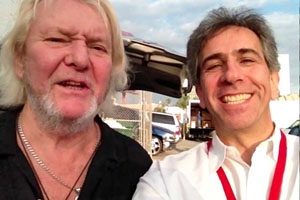
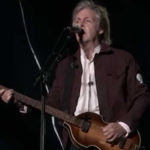
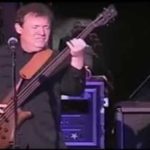
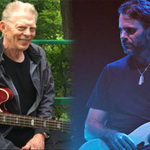
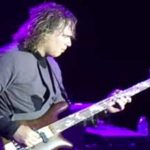
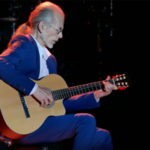

I like this story a lot , Chris squire is my favorite bass player and one of the hardest players to copy. I just miss the show at the tower theater, because I promised my granddaughter I would take her down the shore. I’m hoping Yes comes back around, maybe with their new album. That would be cool. I’m hoping some day I meet Chris. I would love to be a student of his and I am looking in to going to school so I can be the best bass player I can be. I don’t know if I’ll ever make it, but I just want to be good and hold down the groove. P.S. Are there any schools that are good in Philadelphia, PA, and can you direct me to one? Thank you kindly. Vinny vincent sforza.